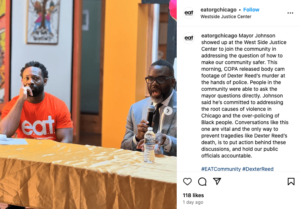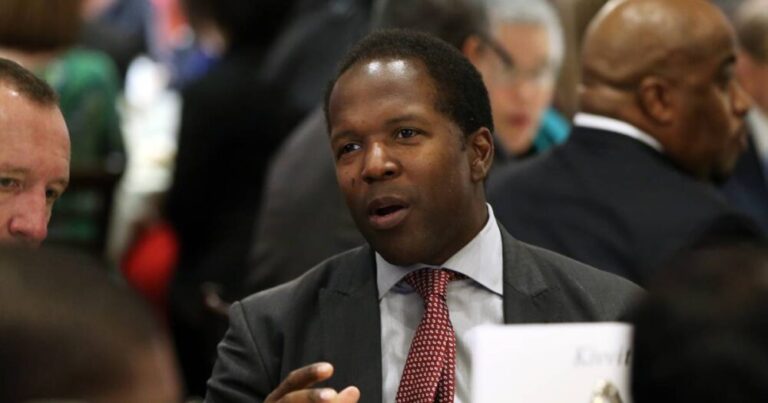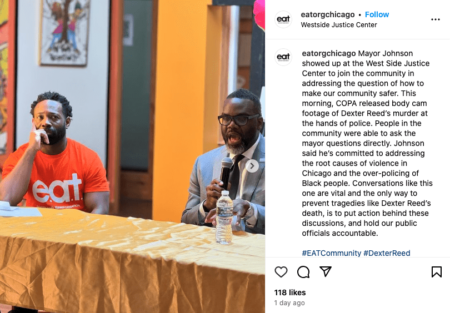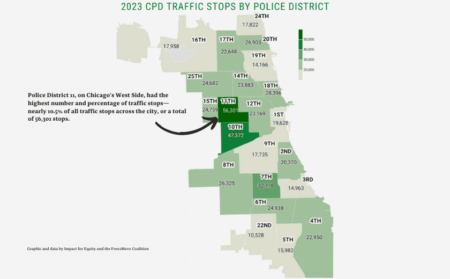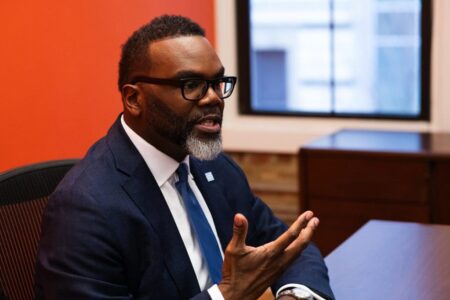For the first time in its 146-year history, the Civic Committee of the Commercial Club of Chicago is tackling crime, looking to bring business leaders to the table in a bid to make the city safer.
The influential organization, which has spearheaded everything from the city’s parks system to modernization of O’Hare International Airport, is outlining a plan to reduce homicides and gun violence in Chicago over the next decade with the backing of the broader business community.
“The issue of public safety is the No. 1 issue for pretty much everyone in the city of Chicago,” said Derek Douglas, who became the first Black president of the Civic Committee in August. “And the business community is no different.”
A former University of Chicago administrator and Barack Obama presidential adviser, Douglas assembled a public safety task force last fall, seeking a platform for business leaders to work with city government, community groups, nonprofits and academics to reduce violence across the city.
The initiative includes community violence intervention, enhanced policing and criminal justice reforms, hiring more broadly from underinvested communities and investing directly in those neighborhoods. The Civic Committee task force has been in touch with the new administration and is “looking to sit down” with Mayor Brandon Johnson to discuss the role business can play in improved public safety, Douglas said.
“Sometimes when people have this discussion of public safety, they either turn to long-term root causes, and that’s what we should be focused on, or they say the house is on fire, let’s just focus on the immediate,” Douglas said. “The approach that we’re taking is we need to focus on both.”
Like many large cities, Chicago saw a spike in crime during the pandemic, peaking at 804 homicides in 2021, mostly from gun violence. While homicides declined to 695 last year, theft and carjackings continued to rise, according to data from the Chicago Police Department.
The Chicago area also saw some high-profile departures of corporate headquarters in 2022, including investment firm Citadel, which moved to Miami along with its billionaire founder, Ken Griffin; Caterpillar, which relocated from north suburban Deerfield to Irving, Texas; and aerospace giant Boeing, which moved to Arlington, Virginia, after more than 20 years in the West Loop.
Griffin, who at the time he announced the relocation decision was funding an ultimately losing campaign for governor by Aurora Mayor Richard Irvin, cited growing crime as a major reason why Citadel and co-owned trading firm Citadel Securities opted to leave Chicago after more than three decades in the city.
Jim Crown, chairman and CEO of Henry Crown & Co., the privately held Chicago-based investment firm, was tapped to head up the public safety task force. He said maintaining Chicago as a nexus of corporate activity was a catalyst for the initiative.
“We have to do our best to stay attractive to the corporate community because of all the benefits that happen for all the citizens here, if we’ve got a stable employment base and employers that are succeeding,” Crown said.
With remote and hybrid working disrupting the corporate world, Chicago offices were at 52% of pre-pandemic occupancy levels in May, according to the latest weekly study by Kastle Systems, which tracks entry badge swipes. That flexibility has made it easier for businesses and workforces to relocate in the post-pandemic landscape, Crown said.
Chicago has benefited from some of those relocations. When Kellogg Co. announced last year plans to spin itself off into three separate companies focused on cereal, plant-based foods and snacks, the snack company chose Chicago for its headquarters. Google, which has its Midwest headquarters in Fulton Market, last summer bought the James R. Thompson Center and plans to open operations there in three years.
But Chicago cannot afford to lag other cities in addressing crime, Crown said.
“The perception of Chicago as a place with public safety issues, and the reaction to that perception, whether it’s tourism or businesses moving here, or just worker safety downtown, that has gotten worse,” Crown said. “And it’s gotten worse for us in Chicago relative to New York or Los Angeles, where they have done a better job, population adjusted, than we have, if you look at the numbers for the last two decades.”
Former Mayor Lori Lightfoot frequently called on the business community to help the city address public safety, noting neighborhoods with high concentrations of poverty and unemployment also experienced higher violent crime rates. The long-term initiatives in her “Our City, Our Safety” plan involved efforts to target those at highest risk of involvement with violence for workforce development programs and “remove barriers to employment” for those with criminal records.
Founded in 1877, the Commercial Club is best known for commissioning the 1909 Plan of Chicago, the “make no little plans” vision of architect Daniel Burnham, which shaped the development of the city, its parks system and its open lakefront for more than a century. The Civic Committee was created in 1983, spearheading such initiatives as education reform, building Stroger Hospital and the modernization of O’Hare.
The task force has set the ambitious goal of making Chicago the safest big city in America, bringing homicides below 400 in five years, and under 200 within the next decade. It is seeking to reduce shootings, which peaked at 3,561 in 2021, down to 2,000 in five years and below 1,000 within 10 years.
“This initiative is not sort of the answer that’s going to solve the public safety crisis in the city,” said Bob Boik, the CPD’s former head of constitutional policing, who is now working with the Civic Committee’s task force. “But we are coming to the table to do our part. And we want to break down those traditional silos and operate under one common set of goals and objectives.”
Both Boik and Crown are on Johnson’s transition team.
Crown, who cited many of the Commercial Club’s visionary achievements over its long history, said fighting crime is a new role for the organization. But as Chicago struggles to recover from the pandemic, making public safety their business has become a priority, just like preserving a recreational lakefront was more than a century ago.
“In some ways, we are newcomers into a conversation that’s been going on for quite a while,” Crown said. “Maybe we’ve got the ability to organize our voices and the political heft that the business community can sometimes have, and help mobilize policy action.”
